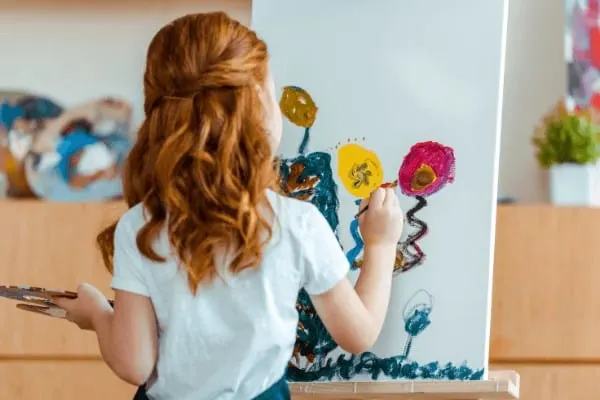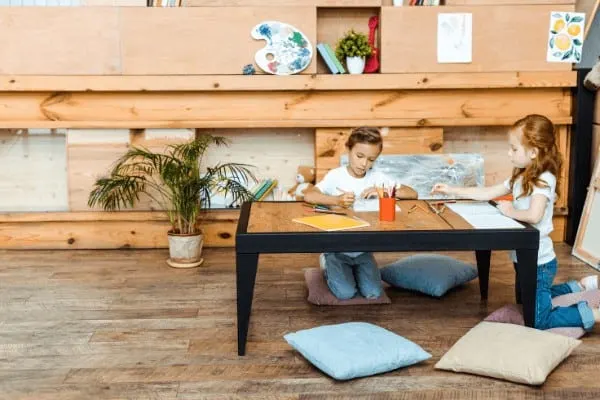If you’ve been considering starting a journal with your little ones, then you’re probably wondering exactly what is the right age to start journaling.
Opinions on this topic vary widely but in our home, journaling is one of those things that we started earlier than most families. My friends are often surprised to find that my kids have had journals since well before they started school!
Of course, they couldn’t always write in those journals. I knew that the best way to prepare them for writing was to get them familiarized with the idea of putting their thoughts and feelings onto the paper… in any form.
But that does beg the question, is it possible to start journaling too early? In this article, we’ll answer that question and give you everything you need to get started journaling with your kids.
But first, let’s take a deeper look at journaling and all of its many benefits.

Benefits of Starting a Journaling Habit Early
One of the main reasons people tend to get children into journaling is to work on academic skills like spelling and grammar. And although that’s an obvious benefit, you can see by the list below that the rewards of journaling with kids go far beyond those simple abilities.
Journaling Will Improve Your Child’s Written Communication Skills
Although it’s not the only benefit, it’s definitely an important thing for your child to practice, so we can hardly overlook this one.
Journal writing will not only help your child develop better spelling, grammar, and handwriting skills but it will help build their language skills to make their overall written communication more eloquent. (And if you’ve ever had to write a cover letter for a resume, then you know exactly why that is so important.)
Journaling Will Help Your Child Build Discipline
Even as adults, it can be pretty difficult to stay disciplined about things like writing in a journal (or doing the dishes…). Doing anything on a daily basis requires a level of self-determination.
People who keep a journal regularly tend to be more self-disciplined overall. So teaching this habit in the early years could potentially have a huge impact on your child’s follow-through as they grow!
Journaling Will Help Improve Your Child’s Emotional Intelligence
One of the most beneficial elements of Journaling is self-reflection. Teaching kids to think cognitively about their own thoughts, actions, and emotions will be incredibly helpful for their overall emotional intelligence.
If you don’t know much about the importance of emotional intelligence, then here’s the one thing you absolutely must know about it: research shows that a child’s emotional intelligence (EQ) is more clearly linked to lifelong success and happiness than their IQ! So building this life skill early has an exponential benefit for little minds!
In fact, you can even work on some very specific EQ skills like learning to be content and grateful. Many people keep a gratitude journal to help remind them about all the things they have to be thankful for!
The Kids Gratitude Kit is a great way to encourage the development of this essential life skill.
Journaling Can Help Improve Your Child’s Creativity
When people think about journaling, creativity isn’t always the first thing that comes to mind but many people find that journals are a gateway to more creative writing.
If you allow your children to redefine the idea of a journal in different ways that get them excited about expressing themselves, you might find that there is actually a creative element to journaling after all.
Your child may choose to keep a standard journal, a poetry journal, a nature journal, a gratitude journal, a story journal, or even an art journal!
Regardless of what type of journal your child keeps, expressing thoughts and documenting the world around them will require them to build some creative skills and to think a bit outside of the box.

Journaling Will Give Your Child a Written Record to Look Back On
I often wish that I had kept better track of my own writings from my younger years. Back then, I had just gotten my first computer and I was inspired by Doogie Howser’s electronic journal. Unfortunately, I didn’t know that I needed to back up any of that writing and one day my little Compaq computer crashed and took my writing along with it!
Fortunately, I did have a few “real” journals from later years.
Having a written record of your thoughts and activities at a young age is both enlightening and embarrassing but I’m so glad that I have mine to look back on. Reading through the things that felt overwhelming to me at 13 makes me realize that someday I’ll look back on today’s overwhelm with amusement too.
You just never know what you’ll end up documenting in your journal that will be valuable to you (or others) in the future. Imagine if Anne Frank had never kept her famous diary. The world would have missed out on an intimate look at that sad time in history.
So What Is the Right Age to Start a Journal?
Although there’s not officially a “right” age to start journaling, in my experience sooner is better! As soon as little ones can hold a pen (or a crayon, a paintbrush, etc.) let them get started on a journal by allowing them to sit in front of a blank page and get creative.
If you’re working with a very young child, you’ll want to read your child’s attitude towards the idea of journaling and test the waters. Remember, your goal is to help them enjoy this activity.
Girls are often more inclined to writing and drawing at young ages so it’s likely that girls as young as two or three would show some interest. Many boys tend to struggle with fine motor skills at younger ages so they may not enjoy this process as much until ages 3,4,5 or even 6!
However, don’t let that stop you from starting up this habit. You can always find ways to make it more exciting for kiddos who aren’t enthused by the idea!
How to Get Kids Excited about Journaling
When you’re just getting started (especially for young children), don’t put too much emphasis on the process, just focus on building the habit itself. Add some version of Journaling to your daily routine.
As parents, we have a bad habit of reaching into our children’s work and “editing” it to fit our idea of “correct.” But if you want your child to enjoy journaling and to feel free to express themselves then you’ll need to fight that urge.
They need to know that there is no wrong way to create a journal. They are meant to display your unique way of looking at the world.
Now, if your child is stuck or having a hard time getting started, you can give guidance if needed but stick to things like questions, prompts, and modeling.
Model Good Journaling Habits
Kids (especially young ones) love to do things together. So if you hand them a journal and then sit down at the kitchen table with one of your own, they’ll probably be pretty excited about getting started.

Building a journaling habit with you (or another family member) will also be a great way to show them how to level up their journaling skills.
If you’re noticing that your child seems a bit stuck and doesn’t seem to know how to begin, try talking through your process out loud as though you were narrating a book.
You might say something like: “I was feeling a bit upset this morning because I woke up so late. It really made me feel rushed and I didn’t like that. I think I’ll write a bit about that today.”
Use Journal Prompts or Questions
Using journal prompts is an excellent way to get started with writing or to take your journaling to the next level. The Big Book of Writing Prompts for Kids is a giant downloadable resource that has a ton of thought-provoking journal prompts that will help your kids think a bit deeper about life.
Older kids might enjoy starting with these creative journal prompts for teenagers.
For younger kids, you may want to start with some simple questions like, “What was your favorite thing that we did today?” or “How did you feel about it when the dog knocked over your block house?”
Young children are very ego-centric (focused on themselves) so teaching them to express thoughts and feelings is one of the first steps. In time, they’ll be able to write more about their thoughts on other people and experiences too.
Buy Them a Personalized Journal
Maybe it’s the teacher in me or perhaps it’s the fact that I used writing as my preferred outlet when I was younger, but every time I walk through a bookstore, I’m instantly drawn to the journal section. There are so many options out there and we’ve tried just about all of them.
Leather bound journals, spiral journals, bullet journals, sketching journals… and the list goes on. Eventually, most people find one style that suits their personality. But when your kids are just starting out, they might have no idea what they’ll actually like (or dislike) about a particular journal.
Instead of trying to guesstimate exactly what will be the right option for your child, I would suggest going with a personalized option for their first journal. Personalizing will make it really feel like it’s their own journal. It will allow them to have a sense of pride, ownership, and connection with the activity, likely helping them get excited about the process!
It’s also important to make sure that the journal is age-appropriate and can be used with purpose.
For example, a child in the preschool age group will need a journal with pages that are easy to turn and leave plenty of blank space for coloring. Consider looking for a blank journal or sketchbook-like journal with spiral binding.
A bullet journal that allows for a mixture of writing and drawing is a good way to allow elementary-aged children to determine how they want to document their world.

Older children and teens may appreciate something a bit more “grown-up”.
Also, keep in mind that if you’re buying a journal to help a child who needs to privately work through something intense, you may want to grab a journal with a lock so that your child has a safe place to express their fears and feelings.
Honestly, you don’t have to have fancy resources to start a journal. A simple notebook won’t necessarily hold the same weight as a fancy personal journal but ultimately it will work just as well for documenting.
So don’t let a lack of resources be a reason to procrastinate.
Just Start
Even if you’ve got the best of intentions, it’s all too easy for us to get caught up in our day-to-day life and procrastinate teaching important habits. But journaling is a simple (and calm) activity that you and your child can enjoy together.
So if you’ve been considering starting a journaling habit with your kids, I would encourage you to grab a journal (or at least a piece of paper) and just get started. I’m pretty sure you won’t regret it!
Jodi and her husband Wil live in rural Pennsylvania with their three children. A teacher by trade and a life-long learner at heart, Jodi pivoted her career to work from home when her twin boys were born. Since then, she has founded 2 websites and assisted in the development of many more.

